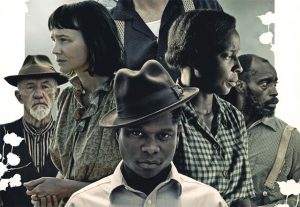(Akiit.com) Writer/director Dee Rees’ 2011 feature film debut Pariah was a depressing but touching look at black lesbian life. This follow-up film is no less weighty. The key difference is the budget ($10M) for this film is bigger and it is used wisely on a top-notch tech crew and fine actors that elevate this southern WWII-era epic. With the cast and crew as her clay, Rees molds all the right elements into strong drama that resonates with deep, deep sorrow.
The McAllan family leaves the comfort of Memphis, TN so Henry (Jason Clarke,Chappaquiddick), the dad, can chase his agrarian life dreams and become a farmer in the rural Mississippi Delta. His dutiful wife Laura (Carey Mulligan) stands by his decision, even as it turns out that he was conned into buying crappy land and a dilapidated house with no electricity or running water.
Down the road from the McAllan’s cotton farm, are their black tenant farmers, the Jacksons, who live in a shack and are headed by patriarch Hap (Rob Morgan) and matriarch Florence (Mary J. Blige). Though slavery is technically over, the relationship between the two families in the segregated south mimics those bonds of servitude. Henry lords over the Jacksons, and the Jacksons do his bidding.
Both clans are lucky when their family members return from the World War II’s battlefields. Jamie (Garrett Hedlund), a pilot, is Henry’s brother and a bit of a misfit. Ronsel (Jason Mitchell), Hap and Florence’s son, comes from a more stable, loving environment. He served in the all-black 76th Tank Battalion in Germany, and there he was largely treated like a human, which ill-prepared him for his return to the Jim Crow South. “Over there I was a liberator,” says Ronsel. “Here I’m just another n______ pushing a plow.”
The two ex-soldiers strike up an unlikely friendship. Their ebony/ivory bond is observed and disdained by the local KKK. Henry and Jamie’s father Pappy (Jonathan Banks), an avowed racist, is appalled. You can feel it in the air. Something bad is going to happen.
Rees’ skilled interpretation of her screenplay, co-written with Virgil Williams and based on a novel by Hillary Jordan, is first-rate on many levels. With her direction, every moment is believable, every downturn is seismic. Rees, cinematographer Rachel Morrison (Fruitvale Station), production designer David J Bomba (Walk the Line) and art director Arthur Jongewaard paint a vivid picture of 1940s Mississippi that is bleak, dusty and muddy all at one time. Their visions embody a hard farming life that is rarely this graphic on the silver screen. Tamar-kali’s entrancing music heightens every feeling, every disaster. Hence the trauma the two families experience, separately and together, reeks with desperation.
The storyline unfolds like a grim southern novel. In minutes, considering the circumstance, you don’t anticipate much optimism. But even with the narrowest expectations for an uplifting ending, what’s on view gives you no ray of light. And, it firmly paints the black family as victims, just about up until the final credits. Even 12 Years a Slave, which was equally as disturbing, took you to a place of real hope. Mudbound doesn’t have that calling.
Jason Clarke exhibits a heartlessness as Henry that embodies the sensibility of poor white male southerners in that era who only felt power by keeping others in their place. Mulligan, as the young wife who has her limits, gives a far more textured performance. Rob Morgan as Hap, the patriarch does well with a role that requires him to withstand pain no one should endure. Mary J. Blige is a nice surprise as Florence. She’s the pragmatic matriarch who blends reason with determination.
Though Hedland and Mitchell enliven the friendship between the two vets, who are experiencing PTSD and covering their illness with booze, their performances are good but not great. That accolade has to go to an unlikely source: Jonathan Banks, who plays Henry’s vile, bigoted dad. He is so demonic and unwaveringly scary that his performance could give you nightmares.
There is an obvious flaw in this perfectly acted, produced and directed art film. The evilness in the movie has stronger staying power than any glimpse of goodness. Mudbound displays way too much despair. Granted, misery might have been a fact of life in the 1940s Mississippi Delta. But that may make it hard for this distinguished film to find more than a small, art house audience.
Columnist; Dwight Brown
Official website; http://DwightBrownInk.com









Leave a Reply